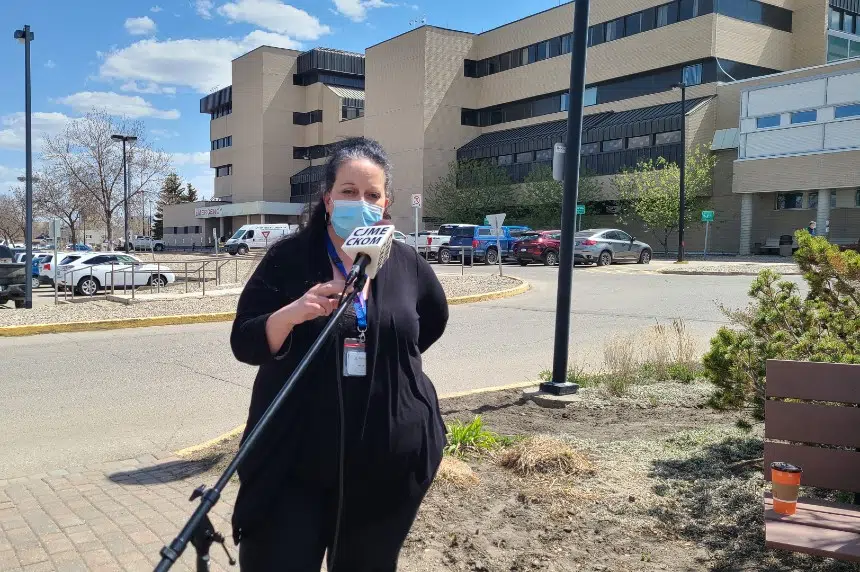It’s been a long, challenging year for nurses on the front line of the COVID-19 pandemic.
“Everything’s rapidly changing. A lot of people don’t take this pandemic seriously. They don’t see what goes on inside a hospital, they don’t see the extra hours and the PPE that everybody has to wear all day long. The family stress, it is taking a toll on everyone,” said Helen Head-Sabtiu, an LPN at the Regina Pasqua Hospital.
This past week has been National Nursing Week, a time to thank those helping to keep people healthy and alive after they contract the deadly virus. But nurses and other health-care providers have needed to take on an additional role during this pandemic as well.
“The moments that stick out are the people who are coming in for their cancer surgeries and they can’t have any family with them. They are going through the most traumatic times of their life alone (and) we’re their support,” Head-Sabtiu said.
“The nurses are also going through traumatic times of their own and we do the best we can and to watch people who have to die alone has to be the worst pain ever.”
Head-Sabtiu was one of the workers who went to help out at Parkside Extendicare after a large outbreak there forced the Saskatchewan Health Authority to get involved.
“I held the hand of four different ladies who were dying at the time and their family wasn’t allowed in,” Head-Sabtiu said.
“It’s definitely a psychological effect because what if that was your mom? What if that was your grandma? People don’t understand that we have to keep people out to protect them.”
Ailene Nyhus also believes nurses have had to become more of a support for people than ever before during the pandemic. She is a continuing care assistant in Weyburn and said it’s a different feeling inside the homes now.
“When talking with the residents or clients (in a normal year), they are more upbeat, they are more happy, they have things to say about their families and stories. The communication is really great. They have visits and everything. Now the morale is really low. They are lonesome and frustrated. It’s different,” Nyhus said.
“Are they going to end their life in this kind of situation? Are they going to see their family or friends? That’s the difference. You can see really see the fear in themselves if they will still see going back to normal times.
“I’ve had my own fears and my own doubts, but when you face (the residents) you need to be strong for them. You have to make sure they can at least see hope from you so it’s a big responsibility for us to do every day.”
Head-Sabtiu was able to peel back the curtain a bit and share what things have been like inside the hospital.
“Surgery right now is very slow because of the slowdown. ICU is overflowing with people that are very, very sick and a lot of it has to do with the COVID virus. Other places you don’t get to be social. You don’t get to sit down and have lunch with your co-workers anymore. You’re banished from bringing food in,” Head-Sabtiu said.
“They’re very long days, they’re working short-staffed, people are redeployed (and) they can’t go to their home units. It’s really depressing actually.”
She said it is frustrating to hear about people protesting restrictions in the province.
“We have people who don’t believe in (COVID). We have anti-maskers that are gathered down at the park. We have people that fight this when it’s the realest thing ever if you’re actually in on it,” Head-Sabtiu said.
She said one of the more positive stories is how well the staff at hospitals have been able to come together to deal with the pandemic.
“The staff are so resilient and holding out for each other. It’s unbelievable. You have a group of people that have been put through hell for this last year,” Head-Sabtiu said.
“It makes you open your eyes to what life really means.”
And the parades and banging of pots and pans to show support for the nurses were noticed.
“It’s a very nice gesture,” she said. “It’s a beautiful thing to show that we’re appreciated. The most appreciation you can do is follow the public health orders, stay home, wash your hands and stay away from Victoria Park (during anti-mask protests).”











